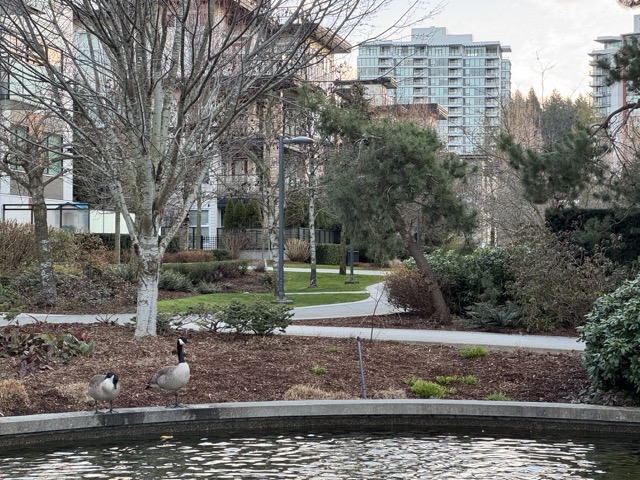They may be seen as a nuisance by some, but Canada geese aren’t going anywhere unless they choose to.
With the arrival of warmer temperatures, residents have reported sightings of the birds, along with some of the adverse effects that can come with their presence.
Many geese have made their presence on campus and in residential areas around Wesbrook, specifically Michael Smith Park and Mundell Park.
“We understand that Canada geese do have some adverse effects in the community such as droppings and grazing,” said UNA communications manager Glenda Ollero in an email to The Campus Resident.
“Canada geese are protected under the Migratory Birds Convention Act, 1994 (MBCA). As they are a protected species, we at the UNA, and the general public, are not allowed to intervene through any management practices.”
Ollero said workers do not specifically clean up after geese in the areas they congregate, but will clean targeted areas such as sidewalks when needed.
Canada geese are not native to British Columbia and are present in the province only as a result of intentional introductions by humans. They were introduced into Metro Vancouver in the 1970s, and they have no natural predators.
The geese are traditionally migratory; however, many populations have stopped migrating due to the availability of prime habitat, with plenty of grass to eat. Birds from Canada’s northern, sub-arctic regions still maintain their well-known migratory behaviour, nesting in Canada and spending their winters in the United States.
According to a Vancouver Park Board report, there were a minimum of 2,200 geese in Vancouver in 2022, with the population estimated to be growing at a rate of 18 per cent every year.
The report included a management plan that proposed culling an undisclosed number of the birds, as forecasting projected the population could increase to 10,000 by 2030.
The report said the geese can pollute beaches and pools, destroy juvenile salmon habitat, and act aggressively toward people and pets.
The City of Vancouver advises people to not feed geese, as it can encourage them to congregate in populated areas. It is also advises to give geese and their goslings lots of space to avoid negative encounters, particularly during the spring nesting season.
EMMANUEL SAMOGLOU IS THE MANAGING EDITOR OF THE CAMPUS RESIDENT.
